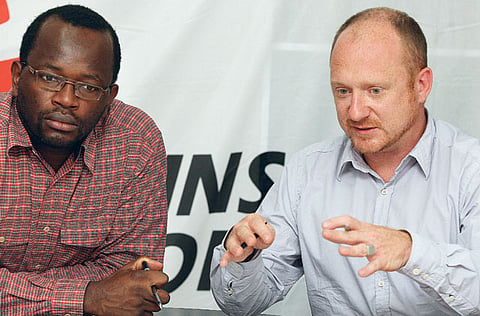Doctors Without Borders outlines relief effort strategy
Aims to prevent spread of diseases and help millions of flood victims

Abu Dhabi: Medecins Sans Frontieres (MSF) or (Doctors Without Borders) has a dedicated team of more than 140 staff from various nationalities who are currently working alongside 1,500 Pakistanis.
Their objective to prevent the spread of diseases and help millions of flood victims. A budget of ten million euros (Dh46 million) prior to the disaster went up to 20 million euros following the flood and is likely to increase.
"The situation is still dire; four weeks after the flood, it remains a major challenge to find a place to organise distributions since a large part of the land in Pakistan is still under water," Brice de le Vingne, MSF Operations Coordinator who has just arrived from Pakistan with Dr Jean-Paul Jemmy, explained.
Fourteen MSF mobile clinics have provided medical services to 16,664 people in remote areas with a high concentration of people such as schools and camps in Dera Murad Jamali, Khabula, Sobhatpur, Malakand, Swat, Lower Dir, Charsadda, Sukkur and Peshawar.
"The spread of diseases related to contaminated water like diarrhoea, cholera and malaria, is a major concern," explained Dr Jemmy.
Basic items
In addition to the increase in medical activities, MSF teams provide daily basic items to affected families such as food and shelter for survival. 4,855 tents were distributed as well as relief kits to 62,566 people.
"Providing clean water remains a major target to the MSF water and sanitation teams who are supporting the local authorities in Charsadda, Nowshera and Swat, to rehabilitate the local water delivery system," Brice said
Across Pakistan, MSF is providing at least 540,000 litres of clean water especially to the remote villages of Khyber Pakhtunkhwa's Charsadda, Swat, Nowshera, Lower Dir and Darga
"It's worrisome that some families with small pumps at home have started using their water source again. The water is still contaminated, and that can lead to many waterborne diseases. We will continue to provide safe water until we can put in place a system to check if the water is good enough for daily use," explained Mohammad Shakeel, a member of MSF's water and sanitation team in Nowshera
Therefore MSF is playing a crucial role in raising people's awareness about health risks and showing them how to use water purification tablets to obtain safe drinking water at home. Relief packages distributed include 20 purification tablets, which provide clean water to a family of seven for a period of two weeks.
MSF is currently treating at least 300 children with severe malnutrition. In addition a daily assessment is taking place in Khyber Pakhtunkhwa and Balochistan to identify pockets of population in need of aid.
Medical assistance
Since 1988, MSF has been providing medical assistance to Pakistani nationals and Afghan refugees suffering from the effects of armed conflicts, poor access to health care, and natural disasters in areas such as Khyber Pakhtunkhwa, Balochistan, and Kashmir.
MSF does not accept funding from any government for its work in Pakistan and chooses to rely solely on private donations.
Sign up for the Daily Briefing
Get the latest news and updates straight to your inbox


